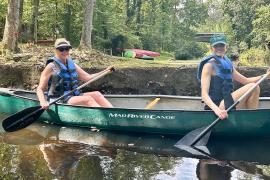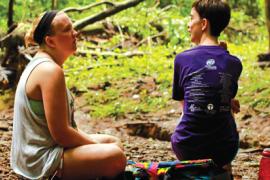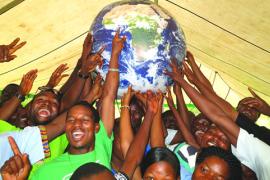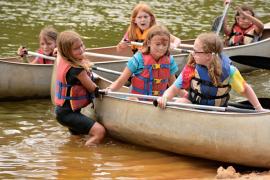It is 6:00 p.m. Campers and counselors eat a tailgate cookout dinner at the Trails End Camp field. Excitement is in the air, as kickoff for the championship game will occur in just over an hour.
Thirty minutes later, back at the bunks, counselors from the Lucky Leprechauns and Alaskan Bullfrogs apply face paint and jerseys in preparation for the Super Bowl. Once applied, the captains provide a riveting pep talk to inspire their teams. "One more game, boys. We have worked hard all summer for this moment. Leave it all out on the field. This is our moment." Cheers ensue as the teams jump up and down chanting, ready for action.
With ten minutes to go until kickoff, the Lucky Leprechauns and Alaskan Bullfrogs arrive at the field. The commentators announce, "The team in green and white is your number one seed, ladies and gentlemen, the Lucky Leprechauns. The red and blue Bullfrogs were 5–1 in the regular season, with their only loss coming at the hands of the Leprechauns. This is the game of the century, folks."
The contending teams burst through banners created by fellow campers in arts and crafts as a cheer explodes from the stands. Flashbulbs go off as the game's broadcasters introduce the players. The officials call over the captain from each team for the opening coin f lip. The Bullfrogs call heads. The championship game is underway.
With the application of the Sport Education model this kind of event can take place at your camp.
What is the Sport Education Model?
Sport Education is a physical education pedagogical model intended to encourage a positive sporting experience for all children by simulating fundamental features of authentic sport. The overriding objective of Sport Education is to provide an authentic sporting experience for children, while hoping to produce competent, literate, and enthusiastic consumers of sport. Specifically, this model allows children to become knowledgeable performers and skillful tacticians as well as demonstrate literacy by valuing sport and comprehending the difference between positive and negative sporting practices (Siedentop, Hastie, & van der Mars, 2011, p. 5).
These overarching objectives can be realized when children participate in a prolonged unit of instruction, called a sporting season. The core of every season is organized around formal competitions where all children participate in modified games while continuing to develop a sense of affiliation with the members of their team. To create an even more authentic and festive atmosphere children take on numerous roles other than player, keep records, and participate in a culminating championship. This framework of teams, team roles, and festivity provides an ideal structure for incorporating Sport Education seasons into a camp environment.
Though generally pertaining to a longer period of time, many of the principles of Sport Education could be applied to sport programs at camps offering one, two, and three-week sessions (or seasons).
Key Features of Sport Education
What makes Sport Education unique from traditional camp activities is that a Sport Education activity resembles a professional or collegiate season. Children remain within a specific team for the entire duration of camp. This prolonged association with team members may lead to increased motivation, with each child heavily invested in the activity. In addition to participating as a player, each child has a special role that helps his or her team function within the requirements of the season. These roles may include coach, official, commentator, newspaper reporter, and statistician, among others (see Table 1), ensuring that each camper not only participates in gameplay, but also contributes in other facets such as organization, officiating, promotion, and instruction as well.
Conducting an activity using Sport Education creates a unique sporting experience for campers in a summer camp setting.
Benefits of Sport Education
Some of the important benefits of Sport Education are derived from campers participating in small group work for their team's benefit. It is important to note that careful consideration should be given to team selection process. The rules for gameplay should be age appropriate and void of adult-like forms of competition. Because of its framework and structure, a Sport Education season provides a wide range of benefits. Following are some examples of benefits that children may experience after participation in a season of Sport Education (Hastie, et al. 2011, p. 5–8).
- Significant improvements in skill levels
- Significant improvement of tactical understanding of the activity
- Increased levels of participation and engagement by most children
- Significant improvement in positive motivational tenets and corresponding decrease in amotivation
- Development of stronger sense of ownership for their learning
- Increased peer support and peer accountability
How to Implement Sport Education at Your Camp
During the summer of 2013, Trail's End Camp in Beach Lake, Pennsylvania, successfully implemented an authentic Sport Education season. Successful implementation of Sport Education requires extensive groundwork, planning, and the full-fledged support of the camp directors. Before implementation, assess your needs and available resources. It is recommended to start small and maintain a manageable ratio of campers to counselors — the smaller the better. If implemented appropriately, a successful Sport Education season can provide campers with hours of enjoyment and offer counselors an original, innovative way of teaching that can be sustainable in following years.
Solicit Support from Directors
Approval and support should be obtained from the director prior to camp. In Trail's End Camp's case, permission was granted to allow one age group to take part in this innovative activity model. The camp schedule had to be altered before camp began to ensure that this group of campers was able to participate in a prolonged season (22 sessions) per Sport Education guidelines.
Allow Students to Take Charge
One of the key features of Sport Education is the gradual shift of responsibilities from adults (counselors and instructors) to children (campers). For example, the gradual shift can be achieved by providing students with choices, allowing them to take on responsibilities while at the same time holding them accountable for learning and appropriate engagement. Keeping this in mind, at the beginning of the season at Trail's End Camp, campers voted for their sport of choice to conduct Sport Education. Flag football won.
Game Play and Officiating
Camp staff should then plan the season (refer to Table 2). Trail's End staff planned the season, organized around formal competition, to incorporate four pre-season games, six regular season games, and a playoff tournament to be conducted during daily activity periods throughout camp. In addition to a newly built field, three other fields were used for practices and games in this season, with each field bearing a creative name generated and voted on by campers.
Different from traditional camp sporting activities, campers are in charge of officiating each game. During an early phase of the season, counselors teach each camper how to referee. For the majority of children this new skill requires considerable practice and assistance, but with training they are able to officiate with a significant degree of success.
For flag football, formal officiating instruction includes basic hand signals, what each penalty is called, and the penalty for each infraction. Following this tutorial, a simulated game is played where counselors model the correct calls and campers mirror them. Once the pre-season games commence campers officiate the games, and are provided with their own whistle and official shirt.
Allow Extra time for Campers to Complete Tasks
A summer camp atmosphere is conducive to high levels of excitement, enthusiasm, and festivity that are all essential for this curriculum to thrive. Because of its novelty, campers might benefit from a brief introduction and overview of Sport Education. Such presentations will aid in creating heightened anticipation for its start.
Once the season begins, incorporating other key features of Sport Education into daily activities may increase its effectiveness and success. For example, campers may be provided with an opportunity to create team posters and logos during arts and crafts, compose team chants in drama, or get additional team practice during free play. In a typical physical education class, these activities occur during one period with limited supplies. However, in a summer camp setting these vital tasks, which are heavily valued by children (Hastie, et al. 2011), can be optimized by integrating them with other camp activities. For example, at Trail's End Camp, each team creates its own poster with the help of the area director and counselors. These posters are regularly updated and hung from cabin walls. They serve as a gathering place on many nights, which further contributes to the festive atmosphere of the season.
Another principle feature of Sport Education is that it incorporates a variety of roles conducive to all different aspects of sport, not just gameplay. One example of this is the role of the newspaper reporter. It is the reporter's job to collect game day statistics, interview players, and write a press clipping on each game. At Trail's End Camp, these reports are read at the evening lineup in front of camp. These diverse aspects of Sport Education extend the experience past traditional gameplay and maximize the sporting experience for each camper.
Recommendations for Counselor Training
Before camp begins, counselors should be provided instruction on the basic aspects of Sport Education, how to implement the model, and their role throughout the season. It is important for the counselors to be aware of the season plans to help all campers achieve the desired outcomes. To aid the season's success, assigning one or two counselors to each team proved most beneficial in our camp, but your requirements may vary. As the Sport Education model shifts responsibility away from adults onto the campers, the counselors should not lead activities toward the end of the season but rather facilitate their completion. An emphasis should be put on counselor training to allow children's engagement in leadership roles and peer instruction, and for counselors to take a less direct approach to teaching.
Beyond improving the physical skills directly related to the sport in question, if the Sport Education model is implemented properly, campers should get a boost in self-esteem and team-building skills, as well.
Find out More
For more information on the key points of the Sport Education model, visit www.slideshare.net/davidfawcett27/sport-education-model.
Reference
Siedentop, D., Hastie, P.A., & van der Mars, H. (2011). Complete guide to sport education (2nd ed.). Champaign, IL: Human Kinetics.
Zachary Wahl-Alexander is a Human Performance PhD student at the University of Alabama in Tuscaloosa. Zachary has worked at Trail's End Camp for the past two summers as a group leader. This upcoming summer he will serve as the boys' head counselor. Zach can be reached at [email protected].
Dr. Oleg A. Sinelnikov is a sport pedagogy associate professor from the University of Alabama in Tuscaloosa. Dr. Sinelnikov has worked at the university since 2007 where he has helped to train physical education teachers.
Photos courtesy of Camp Howe, Goshen, Massachusetts
Originally published in the 2014 November/December Camping Magazine.




